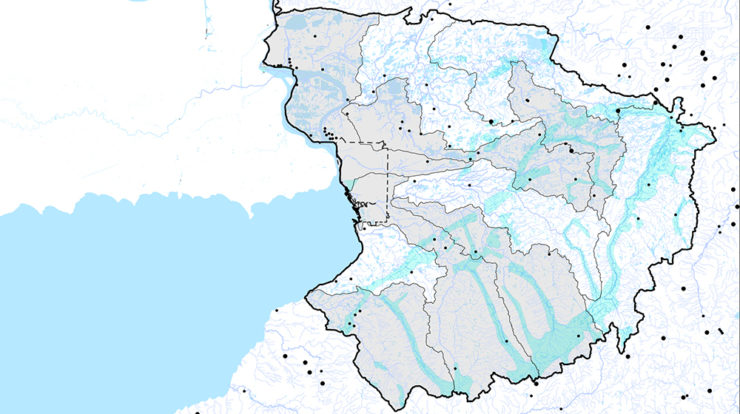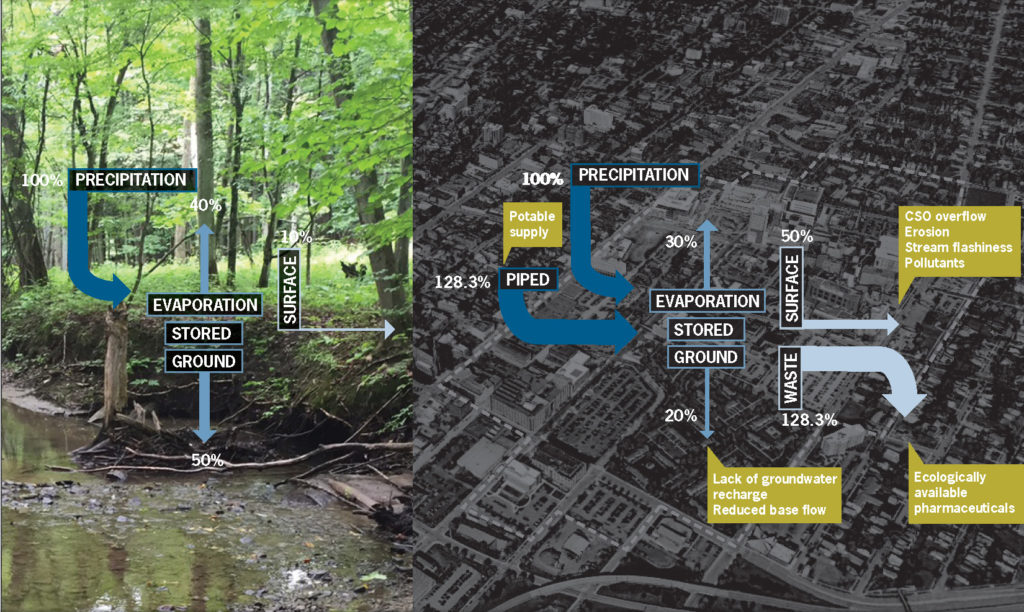

Project Profiles
Buffalo Niagara Riverkeeper Blue Economy Framework
Chris Starkey
Share
Learn more about our Phoebe work and services by emailing us at [email protected]. Follow the conversation on twitter: @TerrapinBG | #PhoebeFramework.
Working with the Buffalo Niagara Riverkeeper, Terrapin used Phoebe (Framework for the Built Ecological Environment) to help develop their pilot Blue Economy Framework. The Blue Economy Framework is a strategic plan for coordinating the major stakeholders of watershed hydrology (industry, agriculture, municipal supply and wastewater, etc) around the goal of protecting water resources. By bringing together disparate efforts to improve water use and quality already occurring in the public, private, and academic sectors, this framework aspires to strengthen the economy and improve the quality of life of residents in the Buffalo Niagara Region.

Comparison of the proportional water flows on a wild plot versus an urban campus within the Buffalo Niagara watershed. Green callouts list potential environmental concerns. Image copyright Terrapin Bright Green.
Terrapin’s role during the development of this framework was to identify and highlight how human activities impact the watershed and other water users, and how factors such as climate change could exacerbate current water issues. By adhering to Phoebe’s goals and principles, Terrapin studied the site hydrology of eight different major water users. Through mapping, interviews, research, and site visits, Terrapin described the interactions between different types of water on site (eg. piped, pumped, or precipitated). Linking hydrologic and hydraulic flows through a site to the impact and value of those flows supplied Riverkeeper with means to assess and describe the mechanics of implementing of a water-focused economy locally. In addition, Terrapin pinpointed pressing water quantity and quality issues facing each site and downstream users. Such an analysis allowed Riverkeeper to identify and focus efforts on win-win scenarios for site owners and the watershed ecology. The expected impacts of climate change and demographics were also described to help contextualize flows within a changing hydrologic regime.
Filed under:
Chris Starkey
Chris is a senior project manager and researcher at Terrapin. He has a multi-disciplinary background, combining the skills of an architect with knowledge from the environmental sciences. In addition to his work on green buildings, waste, energy, and food systems, Chris teaches and writes about ecological design.
Topics
- Occupant Comfort
- Materials Science
- Speaking
- LEED
- Terrapin Team
- Phoebe
- Community Development
- Greenbuild
- Technology
- Biophilic Design Interactive
- Catie Ryan
- Spanish
- Hebrew
- French
- Portuguese
- Publications
- Carbon Neutrality
- Environmental Values
- Conference
- Psychoacoustics
- Education
- Workshop
- Mass Timber
- Transit
- Carbon Strategy
- connection with natural materials
- interior design
- inspirational hero
- biophilia
- economics of biophilia
- Sustainability
- Systems Integration
- Biophilic Design
- Commercial
- Net Zero
- Resorts & Hospitality
- Energy Utilization
- Water Management
- Corporations and Institutions
- Institutional
- Ecosystem Science
- Green Guidelines
- Profitability
- Climate Resiliency
- Health & Wellbeing
- Indoor Environmental Quality
- Building Performance
- Bioinspired Innovation
- Biodiversity
- Residential
- Master Planning
- Architects and Designers
- Developers and Building Owners
- Governments and NGOs
- Urban Design
- Product Development
- Original Research
- Manufacturing
- Industrial Ecology
- Resource Management
- Sustainability Plans
- Health Care


